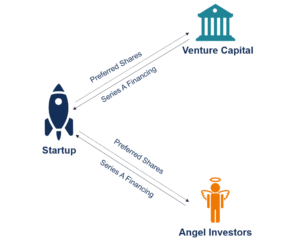In the advanced business scenario, funding and fundraising are the main components that support the development of a startup.
Therefore, the importance of money cannot be overstated, as the mindset of every entrepreneur is directed to growth and expansion.
Why is Funding so Important to Startups?
Starting a company and getting money to run more developments is not easy.
This is why surveys have shown that lack of capital is one of the most common causes of business failure in addition to the challenges involved in pricing and cost issues. This is more a reality than ever, especially in the technology sector.
Thus, the ability to raise funds gives breathing space, as many needs and the ability to solve everyday problems become a lot easier.
Let’s define FUNDING, in the context of entrepreneurship and startups.
Startup financing is the process of raising capital with the help of investors to support a business. Funding can come in many forms and varies depending on the maturity of the company, but the vast majority of startups are involved in fundraising for the sole purpose of enhancing their growth potential.
Funding also increases the visibility of startups and attracts market attention. It adds value to a startup’s products and services and shows potential partners and customers, as well as future investors, that they are worth considering.
It also helps in growing their business networks as well as providing an avenue for expansion. Whether it is to expand the range of their products or services, increase employment, or even expand beyond state borders.
This is why finding investors and raising money is a must!
Big African tech companies like Flutterwave, Andela and Opay were once small start-ups. All thanks to funding, their businesses accelerated, making them the unicorns they are today, and making a huge contribution to the $4.27 billion raised by all African tech startups last year, with Nigeria accounting for 74% of the amount raised.
In light of this, CRESTHUB has reported a lot of fundraising stories with different types of funding like pre-seed funding, seed funding, Series A, B, C, D, and E. So, to understand them clearly, we’ve broken it down for you.
Pre-seed Funding
Although it isn’t always considered an official fundraising round, you can think of a pre-seed round as a warm-up to the foundation round.
Pre-seed funding is the first stage of financing that helps a startup grow. Small capital is basically what is required to start a business and its average is usually $500,000. In some cases, the amount of the initial funding can be less, depending on the source of the investment and the amount requested.
Pre- seeds are usually invested by family members, relatives or small investors.
Seed Funding
The seed funding round is the first “official” round of fundraising for startups. It is mainly used to support the initial operations of a company.
Capital is usually raised from family members, friends or angel investors. Angel investors are the most important players in seed funding, as they can provide a significant amount of capital.
The process of seed financing is very similar to equity financing in which investors disburse money in exchange for a stake in a company. Therefore, the amount raised is highly dependent on the valuation of the startup because this is how most investors estimate their potential return on investment before entering into a deal.
In general, most seed rounds today cost around $1 to $4 million. However, reports show that the average initial seed round for African startups lies at $1.5 million.
Series A Funding
Once startups go beyond the seed capital stage and form a new venture, they start thinking about higher types of funding. Series A funding revolves around a startup’s revenue growth. At this point, talented founders and management staff begin to figure out how their products or services will attract the target market.
In Series A rounds, the largest investors are venture capital firms. Receiving a Series A round is an important event for startups. Aside from the funding being much larger than the seed round, companies need to demonstrate that they have the minimum viable product in place to get an A round and not just a great idea or team.

An average Series A round typically results in investment amounts ranging from $2 million to $15 million. Reports show Series A rounds in Africa ranged from $225,000 to $200 million in 2021, while the average deal volume was at $8.3 million.
Series B Funding
Series B funding is primarily stage 3 start-up financing and stage 2 venture capital financing. It is a type of equity based financing. In other words, investors provide capital for a company in exchange for preferred shares of the latter. Therefore, scalability is the primary focus of this round.
Series B financing also has a high level of risk because startups that succeed in small markets may not be able to survive and grow in larger markets. The average deal volume of Series B funds in Africa is $30 million.
Series C Funding
Startups considering raising a Series C round are entering an exciting territory, because Series C financing aims to prepare a company to be acquired, float publicly on the stock market, and undergo significant expansion.
Startups that are approaching the Series C round have already done a lot of hard work that has led to a successful and rapidly growing company. Entering this stage successfully means that investors are convinced that the startup will continue to generate long-term growth.
On average, a startup needs a valuation of $118 million to enter this stage and can expect to receive Series C funding of $50 million to $80 million.
Series D Funding
The Series D funding round is a bit more complex than previous rounds. As mentioned earlier, many companies finish raising funds through Series C. However, Series D rounds are typically funded by venture capital firms.
The amounts raised and the ratings vary widely, especially because very few startups reach this stage. However, a very good reason as to why Series D investment is needed could be due to the fact that a startup failed to meet its Series C expectations. This scenario would then require that Series D act as a safety net to help ensure that the company’s future returns are not negatively impacted by vulnerable investments.
Series E Funding
Series E is a fundraising round that works very similarly to that of D. Companies that reach this point may raise funds for many of the same reasons indicated in the Series D round. Often the capital raised provides enough startup runway to solve a more complex initiative.
The benefit of this round also provides startups with different opportunities to raise capital and gives them time to learn various exit strategies and creates more flexibility. Therefore, entering into a Series E funding round can significantly enhance the valuation and strategic position of a startup.
Conclusion
The startup financing ecosystem is much more complex now than it was just a few years ago.
Currently, the level of competition in the business market has increased, therefore,it is important for every entrepreneur to keep up with the world’s high standards.
So, with the multiple benefits and different types of financing rounds that we have provided for you; As an entrepreneur and tech enthusiast hoping to build your own startup from the ground, we hope this gives you insight into some of the fundraising processes.
































